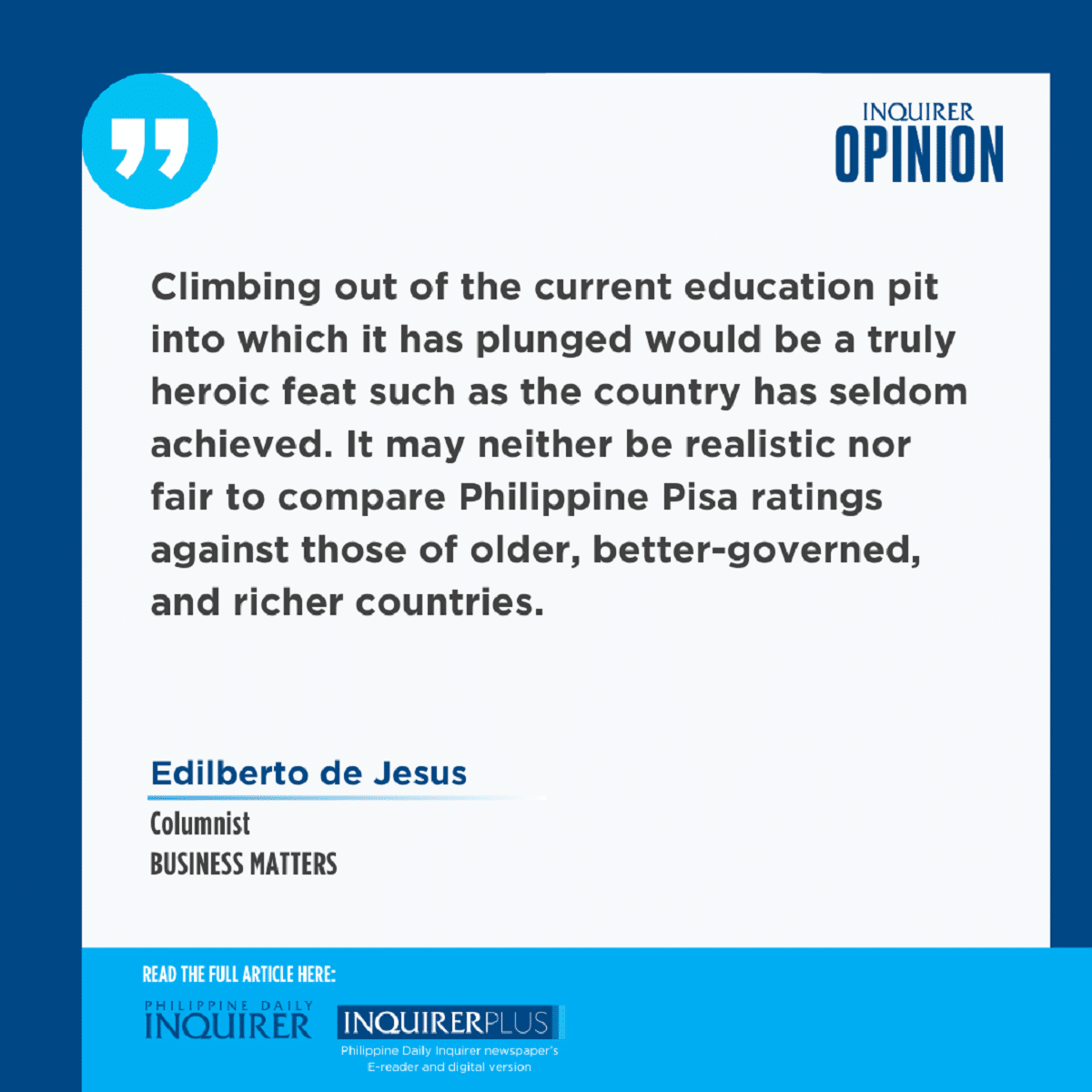
International assessment studies, widely discussed over the last five years, have set formidable challenges and high expectations for the new Department of Education (DepEd) team. In 2019, the World Bank reported that 70 percent of 10-year-old Filipino children suffered from “learning poverty”: they could not read and understand age-appropriate written text. By 2022, that learning poverty had deepened to 91 percent.
Among 79 countries and economies participating in the 2018 Programme for International Student Assessment (Pisa) tests for 15-year-old children, the Philippines placed 79th in reading and 78th in both math and science. With 81 participants in 2022, the Philippines improved to 78th in science, 75th in reading, and 74th in math. It also did better in the 2019 Southeast Asia Primary Learning Metrics assessment to measure the proficiency of 11-year-old students in reading, writing, and math.
The Philippines reached Band 2-3, performing in all three areas at minimum proficiency levels. Ten percent could understand texts with familiar structure. Seventeen percent could perform basic math operations, such as fractions, and interpret simple tables and graphs. In presenting ideas in writing, roughly 54 percent could produce only a few sentences with very limited content.
The majority of Vietnamese students reached the highest band in reading and math and Band 6-7 in writing. They could understand and summarize texts, solve complex math problems, and use appropriate vocabulary in well-organized texts. Students from Malaysia and Myanmar performed at all proficiency bands, with a significant number reaching mid- and high levels. Philippine students shared Band 2-3 with counterparts from Cambodia and Lao PDR. They recognized basic words, understood simple texts, wrote basic sentences, and showed foundational arithmetic skills. Of the Asean 10, only these six countries participated in the 2019 assessment, with Singapore, Brunei, Thailand, and Indonesia declining to join.
Pisa results, however, appeared to register the biggest shock. Pisa was the global, gold assessment standard, covering more participants over a longer timeframe. The comparative rankings perhaps also provoked more damage to national pride and psyche. Especially when viewed from the historical perspective of the educational standards the Philippines had established as a US colony in the ’30s, rebuilt after the war, and sustained through the ’50s.
Climbing out of the current education pit into which it has plunged would be a truly heroic feat such as the country has seldom achieved. It may neither be realistic nor fair to compare Philippine Pisa ratings against those of older, better-governed, and richer countries. But the DepEd mandate to demonstrate measurable improvements in learning outcomes and its continuing participation in Pisa make it difficult to escape comparisons against past ratings. It is thus some comfort to know that even developed countries have suffered setbacks in Pisa standing and have managed to recover.
In the late 1990s, claims of declining, basic education standards in England became a political concern. Between 2000 and 2005, Nick Gibb followed and critiqued the ruling Labour Party’s education programs as the Tory opposition party’s shadow minister for education. With Tory electoral victories, Gibb emerged from the shadows, serving in Tory Cabinets for education issues from 2010-2012, 2014-2021 and 2022-2023.
Between the 2000 and 2009 Pisa tests, England dropped from 7th to 25th place in reading, 8th to 27th in math, and 4th to 16th in science. During his first ministerial term in 2010, Gibb embarked on a program to arrest the slide and regain lost ground. By the 2012 test, the direction had been partially reversed, with improvement to 23rd place in reading and in math to 25th, though science further dropped to 18th place. But by 2022, England ranked 13th in reading, 11th in math and 13th in science.
Recalling the Pisa journey at a recent forum in Australia, Gibb noted the factors that propelled the forward movement. First, the willingness of government reformers to invest in a long-term effort; there are few quick fixes to education problems. Second, high-level, political, and material support from successive prime ministers. And, third, the commitment of time and resources, and the hard-nosed determination to document and pursue only those initiatives backed by evidence-based research.
Granted, DepEd bears a heavier burden over a longer distance. But the task is critical and calls for the government’s sustained commitment of effort and resources.
—————-
Edilberto C. de Jesus is professor emeritus at the Asian Institute of Management.
—————-
Business Matters is a project of the Makati Business Club (makatibusinessclub@mbc.com.ph).